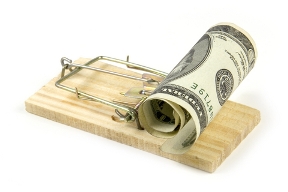We’ve all been there. The car salesman slides the paperwork across the desk at you, pointing at the signature line. Just this one last step, he says, and there’ll be no way out.
At least that’s how it can sound to the customer as she wipes her sweaty palms on the blue Naugahyde, wondering if she’s doing the right thing, wondering if she’s considered everything, wondering if she’s taking too big a…
RISK.
RISK is the dark underbelly of every opportunity, our mother’s voice warning us that there’s no free lunch, P. T. Barnum chuckling about a sucker being born every minute. Suddenly the salesperson is the snake in the Garden, hissing “How ’bout them apples?”—and Eve is sliding her checkbook back into her purse and looking for the exit.
All agreements entail some degree of risk. The best thing any business can do to earn the trust of a potential customer is reverse that risk. You can’t lose it completely, but why not shift it onto your own shoulders? If you as a business can make it clear that all of the risk will be assumed by you, not by the customer, you’ve removed the last real roadblock to the relationship. If you can really demonstrate that there’s nothing to lose and much to gain, signing on that line goes from a sweaty-palmed “I do” to a simple agreement to dance for a little while and see how it goes.
So how do businesses remove the risk roadblock? Depends on the business. Parents who agree to sign their kids up for karate lessons at a reasonable ten bucks a pop get walloped at the first lesson with the oh-by-the-way cost of the karate uniform. Once again Eve’s looking around for the exit. What if little Cain and Abel decide they don’t LIKE karate and we’re stuck with two skimpy white bathrobes?
A smart businessperson will recognize that moment of risk paralysis and create the antidote before the venom can even set in. “The uniform is absolutely free for the first thirty days. If you decide not to continue, there’s no charge.” Voilà! The risk is assumed by the business, and Eve signs on the dotted line.
“But I can’t be giving away free uniforms!” says the shortsighted dojo owner. Fine. Try your own way for a month. Count the customers walking out the door when they hit that risk roadblock. Then try risk reversal for a month. Sure, you’ll get a few customers who fizzle out before thirty days have passed, but you’ll also have a slew of customers with happy kids hooked on your product, parents who signed on for the sweet and lucrative package deal—customers who would have bounced off that roadblock if you hadn’t so wisely removed it.
So you’re not selling karate lessons. But what are the roadblocks that get YOUR customers’ palms sweating—and how can you reverse that risk and dry those palms?


